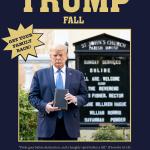The War on Christmas began more than 17 centuries ago when the great Church Father, Clement of Alexandria, first sanctioned the ownership of private property in his Christian community in denunciation of the “swarm of proletarians, derelicts, and beggars who live from hand to mouth, all those wretched cast upon the streets” as “living in ignorance of God and of His justice”
This ran counter to almost every tenant of early Christian theology, which required all those who called themselves disciples of Christ to renounce all their property to give to the needy, and preached a Gospel of radical compassion towards the poor and the marginalized. In the very Christmas carol, Mary sings, upon learning about her conception of Jesus, “My soul magnifies the LORD for… He has brought down the mighty from their thrones and exalted those of humble estate; He has filled the hungry with good things, and the rich He has sent away empty.”
An integral part of the “Good News” as understood by the early Christians was that the Son of God was not a princeling, but a son of common labourers and refugees, victims of imperialism fleeing their homeland in the fear of persecution. Throughout his ministry, this Son of God emphasized that the members of historically neglected groups such as the poor, Samaritans, and children each possess a privileged insight into the spiritual reality he called the Kingdom of God.
Indeed, Jesus repeatedly required those who wished to join the community of his disciples to sell all their property and distribute it among the poor. Often, the abandonment of livelihood and family were also demanded, for whomsoever put his hand back on the plough was not fit to serve the Kingdom of God. The radical renunciation of all property, power, presumptions, and privileges was considered a necessary condition for discipleship in this faith.
The early Christians for a time stayed faithful to this message, and everyone who joined the community of believers sold all their property to distribute the proceeds to each according to his need. The celebration and remembrance of Jesus’s life at this point centered around the breaking of bread and sharing of wine around a common table, Jew and gentile together. No one claimed private ownership of any property, and all goods were held in common among the community. In fact, the only time that God kills anyone in the almost-obsessively pacifistic Christian New Testament is when two new members of the Early Church concealed and withheld from the community a part of the proceeds for the sale of their property.
Mere two centuries later, however, theologians throughout the Mediterranean world had begun to find creative ways to justify the retention of property, powers, and privileges. Clement was by no means alone in his exaltation of private property; the growth of the Christian Church as a relevant institution in Roman society and politics required some measure of compromise with the elites, and its adoption as the official state religion demanded the promulgation of a sustainable incentive structure upon which the imperial economy could operate. For instance, Lactantius, the great Christian advisor to Constantine who likely facilitated the conversion of the emperor and of the empire wrote,“Property contains both vice and virtue, but communitas contains nothing but license for vice.”
It was around this time that Christmas as we know it consolidated as a holiday. While celebrated quietly throughout the private homes at different times throughout the year, Christ Mass coalesced with traditional Roman holy days like the hedonistic Saturnalia and the nationalistic Dies Natalis Solis Invicti—both centred around the Winter Solstice—into a single imperial festival. Under this regime, all theological pretense of accepting the original Gospel message that called for a radical reversal of all traditional power structures was abandoned, much less actual renunciation of property and power. The Church Fathers thus gave into the temptation of bread, glory, and power which its Head so explicitly rejected. Christmas, and Christianity as a whole, had became a tool and symbol of imperial nationalism and legitimation. As Constantine himself so forcefully put it, “Under this sign, thou shalt conquer.” The first stage of the War on Christmas was thus won by the Roman Empire.
The celebration of Christmas largely fell out of fashion with the absence of institutional support after the fall of the Rome, and the faithful in this War once again gained ground with quiet, communal celebration of Jesus’s birth. The Empire, however, struck back when Charlemagne was coronated as the first Holy Roman Emperor on December 25th, 800 AD. Christmas thus once again became a universal cultural celebration tied to political power. Medieval Monarchs like Richard II and James I seized upon the holy day to host great feasts and games that were designed to demonstrate their power and wealth, reaffirm their divine right of kingship as a Christian mandate, and equate their lordship with that of Christ’s; ironic, given that the entire message of the holy day was that the truly divine and royal was made known among the poor, the powerless, and the persecuted.
The truly pious scored a rare series of victories in the War on Christmas after the Protestant Reformation when many reformers sought to officially disassociated with the holiday from state power and the long arm of the papacy. Martin Luther and John Milton both pontificated on the humble, quiet beginnings of the Nativity, while Charles Dickens’ Christmas Carol imprinted on the Anglo-American mind the enduring trope of Christmas as a time for family unity, charity towards the poor, and sharing of food with the hungry.
The faithful, however, won no respite from their victory, as the new invaders in the War on Christmas were far more subtle and powerful than were medieval monarchs, or even Roman emperors. Global market capitalism soon replaced both religion and politics as the master of the holy day, and the festivities came to be largely defined by Black Friday at Walmart, the manger in the Macy’s, and the image of Santa Claus as it was popularized by Coca Cola.
The latest and most insidious blow in the War Against Christmas, however, was struck by the group that calls itself Alt-Right. Possessed of all the worst qualities of its predecessors—Roman nationalism, Medieval reactionism, and consumerist greed—this group once again appropriated the holiday as a tool for its nationalistic, imperialist agenda. They evoked the fear of a dwindling majority, nostalgic of its once-possessed dominance and hegemony over the cultural and political mainstream, and branded all efforts towards inclusion and sensitivity towards historically marginalized groups as “politically correct”, hostile, foreign, dangerous, and emasculated. Once a holy day that was to represent charity towards the poor and compassion towards the marginalized, Christmas had finally become a tool for mobilizing and reinforcing a fictitious persecution complex among a ruling majority.
It seems like the War on Christmas has once again by won by the Empire, though the Resistance trumpets its survival each time that a church or a home opens its gates to the December Cold to let within its walls a homeless person living on steam-vents, a gay or transgender teen estranged from their family, or a refugee seeking shelter from persecution and conflict. This war, after all, preceded us by two millennia, and it will continue to wage long after we are gone.
“We are going to say Merry Christmas again” announced President Trump this October, evoking the tired trope that liberal and secular culture have been waging a “War on Christmas.”
“We’re getting near that beautiful Christmas season that people don’t talk about anymore. They don’t use the word Christmas because it’s not politically correct,” the President said, addressing the conservative Value Voters Summit. “Well guess what? We’re saying merry Christmas again.”
Mr. Trump, as ever, is a master at evoking the nostalgia that his conservative, white, Christian constituents feel about the hegemony they once enjoyed over American culture.
But perhaps we must remind Mr. Trump the point of this holy day is not an opportunity for a powerful majority to to trumpet its dominance, but to remind the poor, the marginalized, and the persecuted that they, too, are welcomed among the people of God. We will together celebrate the end of the “War on Christmas”, not when Christians feel comfortable when they say “Merry Christmas”, but when Jews, Muslims, women, and gay people feel safe, welcomed, and loved, rather than marginalized, when they hear “Merry Christmas”.
- Eugene Nam is an M. Div. candidate at Harvard Divinity School and a J.D. candidate at Harvard Law School.


















